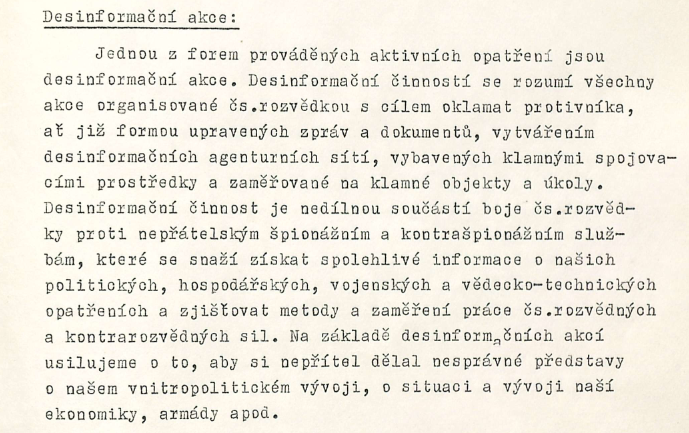Czechoslovakia in the 1948 - 1989 (dis)information war

What does the past – its disinformation and psychological operations, active and influence measures – have in common with today's online world of alternative websites, fake news, hoaxes, conspiracy theories, and the like? People and goals are the common denominator. Today, as in the past, it is about the spreading of half-truths, lies, fear, apprehension and uncertainty, the undermining of stability or calling into question of the value system and the bonds upon which European democracy stands. It is far sadder still that the mass availability of digital technology has shown that this phenomenon has found a loyal audience within society. But who is crafting this content? The aim of this site is to offer insight from a different perspective, to contribute to further discussion and to education on this topic, but perhaps also to provoke deeper reflection…
We present to our readers a new series - Czechoslovakia in the 1948-1989 (dis)information war, which will focus on the history of psychological,→ disinformation and influence operations of the Soviet Union and its satellites during the Cold War, with a special focus on Czechoslovakia. We have already published some selected catch phrases and terminology relating to the history of disinformation, as well as the organizational structure of Czechoslovak Intelligence from 1963-1989, i.e. basic information about the Section (Section 8, later → Section 36 of Directorate 1 of the FMV (Federal Ministry of the Interior) - Department of Active and Influence Measures), which conducted disinformation operations. We are providing an overview of → active measures – this Section's operations from 1970-1989.
By way of analogy, we will look at the current phenomenon of Russian disinformation in the digital era through the lens of the past, i.e. through the "pre-internet" era. We will show readers that this is nothing new and what is currently taking place is based on and has ongoing links to the Soviet era. Only the format has changed. From the perspective of the Communist bloc under the leadership of the Soviet Union, the (dis)information war, aimed at their own people (including countries in the socialist camp) and foreign (capitalist) countries, was one of the central pillars of covert operations. On an ideological level, it was a perpetual struggle against capitalism, and some operations in Western Europe met with quite significant success. The primary target of the Communist bloc (and it seems also that of Russia today) was the so-called "main enemy" - the US, and also NATO, the European Community, "ideo-diverse centres" (critics and opponents of the regime from among exiles) and the Vatican. The mass influencing of the Western public through international organizations, "peace" associations, support for anti-war rallies and demonstrations, communist and socialist parties, politicians, journalists, and academia shows that in the 20th century societies in the West and the East were under the sustained, systematic and subversive pressure of totalitarian ideology, which the East eventually condemned as evil based on its own experience, and which the West has to this day still not yet fully understood.
“The main aim of ideological diversion against socialist countries is the destruction of Marxism-Leninism, the erosion and shattering of the unity between socialist states under the Comecon and the Warsaw Pact, and above all their detachment from the first socialist country in the world – the Soviet Union, the liquidation of leadership figures in communist parties and subversion of the moral-political unity of the citizens of socialist states ... "
(See: Security Services Archive (ABS), f.2 / 3, inv. 822, Collegium of the Ministry of the Interior of the Czechoslovak Socialist Republic, Proposal for the Struggle of the National Security Corps Against Ideological Diversion, Prague, 19 September 1975)
We therefore believe that contemporary Russia can be best understood by studying the past. Up until 1989, Czechoslovakia was still an active player and ally of the Soviet Union in the (dis)information war against the West. Today's media and analysts generally mention the link with the past, but so far there has been no consideration of this phenomenon from the perspective of disinformation operations before 1989. In the overall context these operations offer the possibility of a better understanding of totalitarian or authoritarian regimes and their instruments. They also help us understand other aspects, such as motivation, goals, methods and forms, or the players involved.
In the project we intentionally do not focus on the person of the former deputy chief of disinformation of Section 8 of Czechoslovak intelligence Major Ladislav “Brycht” Bittman, who was known mainly for → Operation Neptune and for his successful defection to the USA in 1968. Many media items, i.e. publications and articles, exist about him and many current disinformation studies are based on these. We have decided to introduce to readers less well-known psychological and disinformation operations of Czechoslovak intelligence, which it carried out independently, or in cooperation with "Friends", on the American continent, in Western Europe, and from third country staging grounds to influence society at home and abroad. We will also take a closer look at the current view of the "main enemy" (the USA) towards these disinformation activities, as well as the impact these operations had (see Operation Denver on the spread of AIDS, the fake political will of Konrad Adenauer, etc.). We will also look at other instruments of the (dis)information war, which Czechoslovakia used against its home audience. Articles are also supplemented by archive documents (Security Services Archive, Slovak NMI Archive), photographs and inserted comments.
In 1989, despite the massive disinformation campaigns against the West, these regimes built upon violence and lies, came tumbling down. Internally and spiritually depleted, worthless and decrepit, they did not offer people a better life in real freedom.
“They did nothing, drank endlessly, stole from themselves, grabbed and pushed bribes, lied in their summary reports from the podium and on the pages of newspapers, they were even intoxicated by their own deceitfulness and hung medals on each other's chests.“ - Nikolai Ivanovich Ryzhkov, Member of the Politburo of the Central Committee of the CPSU, Chairman of the Council of Ministers from 1985-1991 under M. Gorbachev (A History of 20th Century Russia, Andrei Zubov (ed.), Argo 2014)
Content
Further articles on topic:

Fig. Definition of disinformation action from a document - Implementation of Effective Active Measures - One of the Main Tasks of Czechoslovak Intelligence, Source: ABS, f. SF 01/11; bottom: Top Secret Order of the Minister of the Interior Lubomír Štrougal No. 37/1962 (22 Nov 1962) - establishment of disinformation department of Czechoslovak intelligence. Source: ABS, f. A 6/4, inv. 870

This project was created in cooperation with: Platform of European Memory and Conscience, Centre for Documentation of Totalitarian Regimes, Living Memory, Konrad Adenauer Foundation



